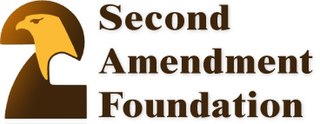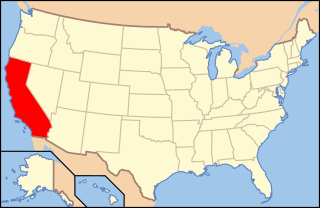Related Research Articles

The National Rifle Association of America (NRA) is a gun rights advocacy group based in the United States. Founded in 1871 to advance rifle marksmanship, the modern NRA has become a prominent gun rights lobbying organization while continuing to teach firearm safety and competency. The organization also publishes several magazines and sponsors competitive marksmanship events. According to the NRA, it had nearly 5 million members as of December 2018, though that figure has not been independently confirmed.

Gun politics is defined in the United States by two primary opposing ideologies about civilian gun ownership. Those who advocate for gun control support increased regulation of gun ownership; those who advocate for gun rights oppose increased restriction of gun ownership. These groups often disagree on the interpretation of laws and court cases related to firearms and of the effectiveness of firearms regulation on crime and public safety. There is also a well-known gender gap when it comes to gun control, and many argue that a possible explanation for this is authoritarianism. It was estimated, in 2018, that U.S. civilians own 393 million firearms, and that 40% to 42% of the households in the country have at least one gun. However, record gun sales followed in the following years. The U.S. has by far the highest estimated number of guns per capita in the world, at 120.5 guns for every 100 people.

Brady: United Against Gun Violence is an American nonprofit organization that advocates for gun control and against gun violence. It is named after former White House Press Secretary James "Jim" Brady, who was permanently disabled and later died in 2014 as a result of the Ronald Reagan assassination attempt of 1981, and his wife Sarah Brady, who was a chairwoman of the organization from 1989 until her death in 2015.
Gun laws in the United States regulate the sale, possession, and use of firearms and ammunition. State laws vary considerably, and are independent of existing federal firearms laws, although they are sometimes broader or more limited in scope than the federal laws.

The Protection of Lawful Commerce in Arms Act (PLCAA) is a U.S law, passed in 2005, that protects firearms manufacturers and dealers from being held liable when crimes have been committed with their products. Both arms manufacturers and dealers can still be held liable for damages resulting from defective products, breach of contract, criminal misconduct, and other actions for which they are directly responsible. They may also be held liable for negligent entrustment when they have reason to know a gun is intended for use in a crime.

The Second Amendment Foundation (SAF) is a United States nonprofit organization that supports gun rights. Founded in 1974 by Alan Gottlieb and headquartered in Bellevue, Washington, SAF publishes gun rights magazines and public education materials, funds conferences, provides media contacts, and has assumed a central role in sponsoring lawsuits.
Proposition H was a local ordinance on the November 8, 2005 ballot in San Francisco, California, which gained national attention for its banning of most firearms within the city. The measure passed with a yes vote of 123,033 to a no vote of 89,856. The proposition was later struck down in court.
In the United States, access to guns is controlled by law under a number of federal statutes. These laws regulate the manufacture, trade, possession, transfer, record keeping, transport, and destruction of firearms, ammunition, and firearms accessories. They are enforced by state agencies and the federal Bureau of Alcohol, Tobacco, Firearms and Explosives (ATF). In addition to federal gun laws, all state governments and some local governments have their own laws that regulate firearms.
District of Columbia v. Heller, 554 U.S. 570 (2008), is a landmark decision of the Supreme Court of the United States. It ruled that the Second Amendment to the U.S. Constitution protects an individual's right to keep and bear arms—unconnected with service in a militia—for traditionally lawful purposes such as self-defense within the home, and that the District of Columbia's handgun ban and requirement that lawfully owned rifles and shotguns be kept "unloaded and disassembled or bound by a trigger lock" violated this guarantee. It also stated that the right to bear arms is not unlimited and that certain restrictions on guns and gun ownership were permissible. It was the first Supreme Court case to decide whether the Second Amendment protects an individual right to keep and bear arms for self-defense or whether the right was only intended for state militias.

Gun laws in California regulate the sale, possession, and use of firearms and ammunition in the state of California in the United States.

GeorgiaCarry.org (GCO) is a state-level gun rights organization that is dedicated to preserving and protecting the rights of its members to keep and bear arms as protected by the Second Amendment to the United States Constitution and Paragraph VIII of the Constitution of the State of Georgia. On its website, the organization describes itself as "Georgia's no-compromise voice for gun owners." The organization is also referred to as Georgia Carry in conversation and press coverage. It is a non-profit corporation organized under the laws of the State of Georgia. It has been described as Georgia's "powerful firearms lobbyist" that "makes the National Rifle Association look like a popgun group".
McDonald v. City of Chicago, 561 U.S. 742 (2010), was a landmark decision of the Supreme Court of the United States that found that the right of an individual to "keep and bear arms", as protected under the Second Amendment, is incorporated by the Due Process Clause of the Fourteenth Amendment and is thereby enforceable against the states. The decision cleared up the uncertainty left in the wake of District of Columbia v. Heller (2008) as to the scope of gun rights in regard to the states.

Rocky Mountain Gun Owners (RMGO) is a 501(c)(4) non-profit gun rights advocacy group in Colorado, United States.

The Giffords Law Center to Prevent Gun Violence, previously known as the Legal Community Against Violence and the Law Center to Prevent Gun Violence, is a national public interest law center and nonprofit organization that promotes gun control legislation in the United States and conducted litigation against the gun industry. The Giffords Law Center publishes information about gun laws and gun control. The organization offers legal assistance to public officials, and publishes research on gun laws and gun violence. The organization is currently led by former US Congresswoman Gabby Giffords.
In the United States, the term constitutional carry, also called permitless carry, unrestricted carry, or Vermont carry, refers to the legal public carrying of a handgun, either openly or concealed, without a license or permit. The phrase does not typically refer to the unrestricted carrying of a long gun, a knife, or other weapons. The scope and applicability of constitutional carry may vary by state.

Gun laws in the District of Columbia regulate the sale, possession, and use of firearms and ammunition in Washington, D.C..

Gun laws in Illinois regulate the sale, possession, and use of firearms and ammunition in the state of Illinois in the United States.

Gun laws in Pennsylvania regulate the sale, possession, and use of firearms and ammunition in the Commonwealth of Pennsylvania in the United States.
People v. Aguilar, 2 N.E.3d 321, was an Illinois Supreme Court case in which the Court held that the Aggravated Unlawful Use of a Weapon (AUUF) statute violated the right to keep and bear arms as guaranteed by the Second Amendment. The Court stated that this was because the statute amounted to a wholesale statutory ban on the exercise of a personal right that was specifically named in and guaranteed by the United States Constitution, as construed by the United States Supreme Court. A conviction for Unlawful Possession of a Firearm (UPF) was proper because the possession of handguns by minors was conduct that fell outside the scope of the Second Amendment's protection.
New York State Rifle & Pistol Association, Inc. v. Bruen, 597 U.S. ___ (2022), abbreviated NYSRPA v. Bruen and also known as NYSRPA II or Bruen to distinguish it from the 2020 case, is a landmark decision of the United States Supreme Court related to the Second Amendment to the United States Constitution. The case concerned the constitutionality of the 1911 Sullivan Act, a New York State law requiring applicants for a license to carry a concealed pistol on their person to show "proper cause", or a special need distinguishable from that of the general public, in their application.
References
- ↑ "NRA Targets San Francisco, Chicago". CBS News. 2008-06-27. Archived from the original on September 29, 2008.
- ↑ "SF Calls NRA Lawsuit 'Slipshod', 'Waste Of Time'". NBC11.com. 2008-06-30. Archived from the original on July 14, 2008. Retrieved 2008-07-14.
- ↑ Egelko, Bob (January 14, 2009). "San Francisco Housing Authority settles gun lawsuit". SFGate.com. Retrieved 2009-01-16.